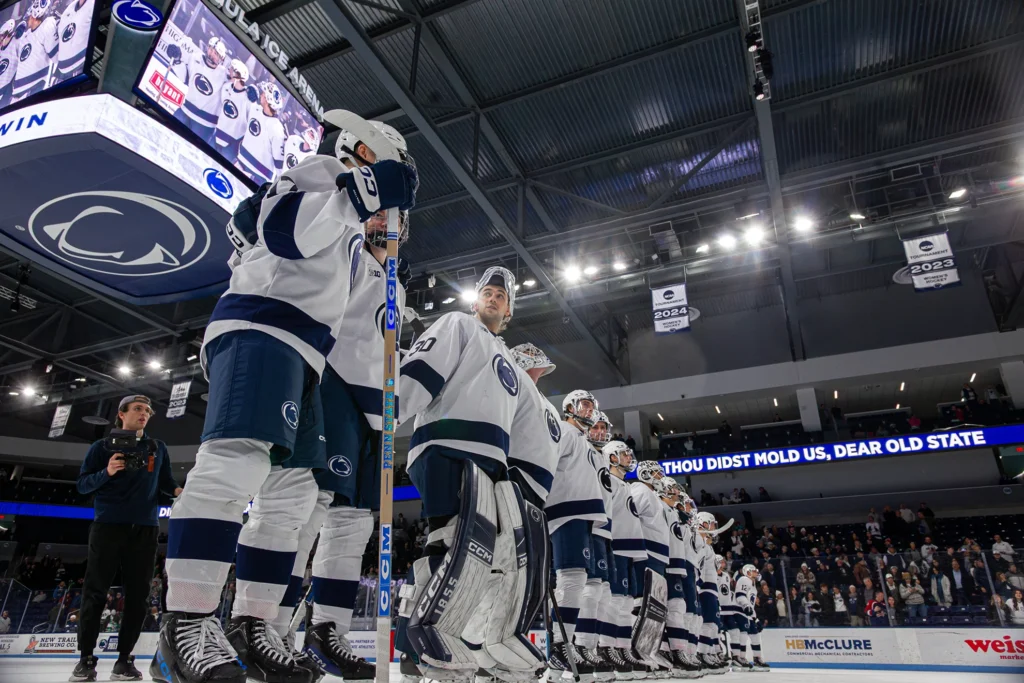
Every season some group of three players, one of the team’s lines, gets tabbed as the “identity line” for the Penn State men’s hockey team.
It’s an honor, a nod of the head to some gritty, productive group that helps keep the team balanced overall and helps bring games back from the brink when necessary. It might not be the team’s most productive line, but it could be its most important.
Here’s the thing, though, there’s no identity line without a solid team identity first.
As Penn State prepares for its first Frozen Four appearance — a national semifinal matchup against Boston University on Thursday night in St. Louis that offers uncertainty about the outcome (every team is championship-quality at this point) — there’s no doubt about what defines the Penn State program.
It’s a blue-and-white team with a generally blue-collar approach, usually executed at high speed. It’s competitiveness and grit. It’s passion and a team-first outlook. It’s reliance on the collective more than the individual.
Part of that makeup comes because coach Guy Gadowsky is a bit of a romantic, who empowers and trusts his players. And part of that makeup comes because Gadowsky is a competitive grinder, something he values in his players as well.
While the coach looks good in a suit and tie, he’s at his best, and probably most comfortable, in less buttoned-down attire. One of the Penn State men’s hockey team’s social media efforts this week, part of its “This is Hockey Valley” campaign, deftly offered insight and bit of humor around the subject.
Those down-to-earth traits have served the program well from its inception and throughout the past 13 seasons — especially so as this season.
This season’s identity line actually includes four players, according to Gadowsky. That’s Dane Dowiak, Keaton Peters, Tyler Paquette and Carson Dyck — a sophomore, a freshman, a player working on his graduate degree and a senior, respectively.
Statistically, that group has combined for 18 goals, but goal scoring is not really the group’s job.
They know the team and its approach. They grind, hustle, lead and even observe. Leading this season meant leaning into positivity, especially amidst the team’s early season struggles. Observing meant allowing the program’s DNA to further influence how they do what they do.
During the playoffs a second identity line has emerged as well — with Nic DeGraves, Ben Schoen and Dylan Lugris allowing the coaching staff to comfortably utilize the team’s depth while other teams might focus on just a couple of lines to try to prompt productivity.
Everyone associated with the Penn State program points to the team’s competitiveness, with darts and ping pong in the locker room as examples. Even chess has been added to the list. After Paquette easily dispatched Gadowsky in a match when that game first showed up in the locker room, he noticed some improvement in the coach’s play the next time they huddled around the chess board.
“We got the chess boards a year ago and I probably beat him in 30 seconds the first time,” Paquette said. “Then I played him a month later and he had gotten drastically better. So, you just know he’s on his phone 24/7 playing against bots trying to get better. He’ll never tell you that, but he just magically got better in like a month.”
That’s the same competitiveness and determination Gadowsky (and his players) bring to almost anything.
On a visit to our football tailgate last season, Gadowsky and assistant coach Andrew Sturtz struggled early in a cornhole matchup but recovered and won. If was a generally beverage-toting crowd and low-key situation, but that sneer the coach unveils when talking about a determined, hard-hitting or strong-willed player returned just because he was playing for something. Even if it was just bragging rights.
Ironically, Penn State rarely brags. Even as team members name-dropped when interacting with the media this week, their shoutouts were not to A-list types but more consistently praise for comparatively unknown contributors who made a difference just by being themselves and working hard.
So, the team talked about John Seifarth, the team’s No. 3 goalie, a former club player with no high school hockey experience, who was forced into action for five games and won his first two starts this season at went at a time when the team desperately needed some victories. Likewise, Gadowsky stressed that the foundation for the program rested on players like Ricky DeRosa — and many others — who embraced the challenge of building a program, working for something that would be bigger than them someday without worrying about accolades for themselves.
Penn State enters the Frozen Four as the lowest-seeded of the four teams. While it has earned its spot in St. Louis and could win two more games to complete a truly special season, the Nittany Lions know they’re the biggest underdog of the bunch.
While Gadowsky has not specifically addressed it, he knows the players have a chip on their shoulder with something to prove — as they have in many ways since January.
Maybe the grit and determination, the talent and speed, even the shoot-shoot-shoot offensive approach might not be enough. This season could end Thursday. That’s possible, after all.
Still, just getting to the Frozen Four is huge — much bigger and more unlikely than making the 12-team field for the College Football Playoff — and win or lose Penn State’s success this season has further defined the program in a way some probably thought was not possible.
It turns out that prove-people-wrong, do-something-special approach just offers another glimpse of the team’s identity.
If you’ve enjoyed this content, please subscribe to Stuff Somers Says With Steve on YouTube. Or join our newsletter by entering your email below.
